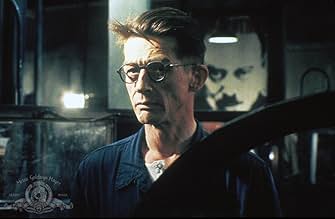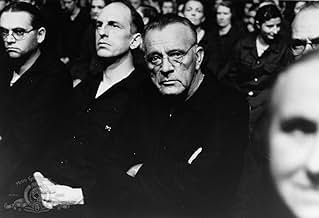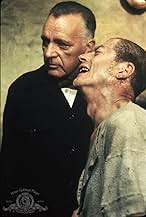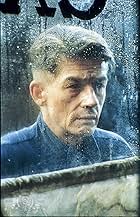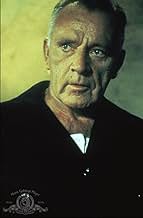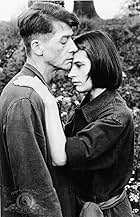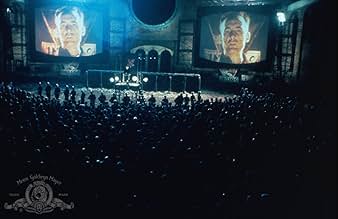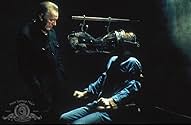Dans une société totalitaire du futur, un homme dont le travail consiste à réécrire l'histoire tente de se rebeller en tombant amoureux.Dans une société totalitaire du futur, un homme dont le travail consiste à réécrire l'histoire tente de se rebeller en tombant amoureux.Dans une société totalitaire du futur, un homme dont le travail consiste à réécrire l'histoire tente de se rebeller en tombant amoureux.
- Réalisation
- Scénario
- Casting principal
- Nomination aux 1 BAFTA Award
- 6 victoires et 3 nominations au total
Avis à la une
God forbid!
Winston Smith (John Hurt) is a drone worker in the Bureau of Information, and his job is to edit the news in accordance with the needs of the governing Party (which is in continual, seemingly endless war with Eurasia and other opposing states). He must also refer to the dictionary of Newsspeak, which is the government's language for the distribution of information.
He lives in a world where there is no escape from the authority of the government who regiment the every thought and deed of their subjects. The Party is steadily working on a way to outlaw the concept of the family and the idea of conception. This is done to eradicate Thoughtcrime and guarantee the worker's total devotion to the Party and its leader, Big Brother.
Winston abides by this (recording his increasingly ambiguous thoughts about society in a hidden, handwritten diary) until he encounters Julia (Suzanna Hamilton), a strange young women with rebellious ideas, to whom he develops a powerful attraction. But their passionate, forbidden relationship cannot escape the all-seeing eyes of Big Brother.....
Screenwriter Jonathan Gems has a done a terrific job with the script. He successfully translates Orwell's ideas to the screen with great clarity. Micheal Radford directs with subtlety around the greasy sets and crumbling locations (the picture was filmed in and around the very area in which Orwell set his novel).
The performances from the chief principals are very strong. John Hurt is excellent as Winston, bringing a subtle and considerate approach to the character. Particularly disturbing is his final scenes, as he becomes gaunt and disfigured through government torture. Suzanna Hamilton is gentle and quirky as Julia and "Rab C Nesbitt" actor Gregor Fisher appears as Winston's ill-fated friend, Parsons.
Veteran actor Richard Burton lends a cold charisma to government enforcer O'Brien and he too excels in the film's final moments, as he coolly and sadistically tortures Winston, subjecting him to severe physical pain to subdue him, casually pulling a tooth out of his rotting mouth, then exposing him to the horrors of Room 101, all the while exhorting obedience to the Party and love to Big Brother.
The strong relevance of the concepts of "Nineteen Eighty Four" should not be underestimated. Whilst the term "Big Brother" is now synonymous with the ridiculous "reality" TV shows of the same name, others like the Two Minutes Hate (in which the workers are coerced, through a two-minute broadcast, into hating the enemies of the state); the idea of a government waging a perpetual war to advocate "peace" (especially relevant in the aftermath of September 11) as well as the editing of news and the abuse of language in order to suit the needs of government and disguise its true agendas are ideas that are chillingly present in today's society.
All of this is powerful and thought-provoking stuff, and helps to make "Nineteen Eighty Four" an accurate and powerful rendering of a still very timely piece of work.
The film was obviously a labor of love for director Michael Radford, who also co-wrote the screenplay. As noted in the end credits, the film "was photographed in and around London during the period April-June 1984, the exact time and setting imagined by the author". If this were a big-budget Hollywood bomb, I might consider that a publicity stunt, but in the case of this little-known, little-seen British film, it's fairly obviously a form of homage.
The look of the film is extraordinary in its evocation of the world Orwell created, down to the tiniest detail. Although that world was obviously very different from the real world of 1984, a deliberate choice was made to stick with the Orwellian vision in every way, anachronistic technology and all, and I firmly believe it was the right choice, as opposed to the "updating" we sometimes see in adaptations of classic "futuristic" stories. Thus, we are treated to the baroque and slightly disorienting sight of black rotary-dial telephones, pneumatic document-delivery systems, old-fashioned "safety razors", tube radios, etc., all of which were already obsolete at the time of filming. And of course, the omnipresent black-and-white "telescreens" with rounded picture tubes.
As Winston Smith, the story's protagonist, John Hurt is an inspired piece of casting; absolutely the perfect choice. Not only does he fit the author's description of Smith to a "T", but with the haircut he's given, he even bears a striking resemblance to Orwell himself. And there is no actor alive better than Hurt at evoking victimization in all its infinite gradations and variations. Suzanna Hamilton, relatively little-known here in the US, also does a fine job as Julia. The film also contains the final film appearance of Richard Burton, in one of his most fascinating and disturbing performances as O'Brien. And the great Cyril Cusack does a classic turn as Charrington, the pawnshop proprietor.
Right from the opening scene, in which we look in on a screening of a short propaganda film, brilliantly conceived and executed by Radford, during the daily "two minutes hate", climaxing in Dominic Muldowney's memorable, genuinely stirring national anthem of Oceania played behind the gigantic image of Big Brother, we are catapulted headlong into Orwell's nightmare vision. While not a particularly long novel (my copy is 256 pages), it is nevertheless dense with ideas, and it would be impossible for a standard-length film to include them all, even if the audience could stand all the endless talking heads it would require. Given the inherent limitations, I think the film largely succeeds in preserving a good portion of the ideological "meat" of the novel. It is certainly extremely faithful in the material it does include. Even the incidental music by Eurythmics feels entirely appropriate, and doesn't in any way break the mood. In fact, it even enhances it.
While I thought the 1956 version did a fairly good job for the time, it had a number of flaws in my estimation that made it far less successful an adaptation. For one thing, although the world it portrays is grim, it's not nearly grim enough. Also, Edmond O'Brien may have done a creditable job as Smith, but physically he's all wrong for the part. The portly, even chubby O'Brien bears little resemblance to the slight, emaciated, chronically exhausted, varicose-ulcerated Smith described in the novel. Neither is the 1956 version as faithful to the book; some of the material is softened, and there are odd, unexplainable alterations: O'Brien becomes O'Connor, and I don't think that Goldstein, the possibly imaginary leader of the possibly fictitious "Resistance", is even mentioned. At 90 minutes, it runs a good 23 minutes shorter than the later version, which necessitates the trimming of even more of the novel, for all you literary purists. In all, for me, the 1984 version of "Nineteen Eighty Four" is the definitive version; a remarkably vivid and memorable film.
But I'm confused by the number of people who have commented that claim to be put off by "the gratuitous nudity" by the two characters of Winston and Julia. Given the fact that everything in this society--waking up, food, habits, desires, work, workers, even the underwear and overalls--is so uniform, has it occurred to viewers that being nude was the only link to identity that these characters had? Everything in their world depends, thrives on sameness. Without clothes, everyone is unique. The two lovers were already in dire conditions by committing the sin of feeling for another human being, let alone carnally but in the heart. And they had to deceive and pretend and go through the motions of the dutiful cogs in the Big Brother wheel. But their only shared peace and comfort was their sacred time alone, and in love. They had finally found their own identities through loving each other. Their nudity was merely symbolic of that. In that sense, their union and expressions of that union only becomes more fragile, beautiful and honest, in such a heartless, cold, indifferent world.
May that be truly said of us, and all of us...
OK, that out of the way...one of the most gritty, realistic, honest translations ever to grace the screen. Wouldn't have changed a thing. Highly, highly recommended, along with the original 1955 version of "Animal Farm". Perfect double-feature for a somber, thoughtful evening's viewing.
While not necessarily a "horror" movie, there is no doubt that "1984" is among the most genuinely SCARY films that I have ever seen. Both the book and film have succeeded in making me shake like drug addicted pepper and salt shakers. The dystopia depicted here accurately displays the horror of an overly controlling and oppressive government system forcing its propaganda upon those below, and outwardly embracing anti-free speech and pro-war beliefs. I must restate how sadly relevant this work remains.
Le saviez-vous
- AnecdotesIn poor health during most of the filming, Richard Burton had great difficulty remembering his lines and sometimes had to film a scene dozens of times before he could get it right. The scene in O'Brien's apartment where he is talking to Winston about Goldstein's book took a record of forty-one takes for Burton to say his speech without fumbling his lines.
- GaffesWinston reads a newspaper article titled "INSOC IN RELATION TO CHESS BROTHER WINS." The party name should be spelled "INGSOC."
- Citations
Winston Smith: [reads from Goldstein's book] "In accordance to the principles of Doublethink, it does not matter if the war is not real, or when it is, that victory is not possible. The war is not meant to be won. It is meant to be continuous. The essential act of modern warfare is the destruction of the produce of human labor. A hierarchical society is only possible on the basis of poverty and ignorance. In principle, the war effort is always planned to keep society on the brink of starvation. The war is waged by the ruling group against its own subjects. And its object is not victory over Eurasia or Eastasia, but to keep the very structure of society intact." Julia? Are you awake? There is truth, and there is untruth. To be in a minority of one doesn't make you mad.
- Crédits fousThe movie begins with the title, "Who controls the past controls the future. Who controls the present controls the past."
- Versions alternativesFrom director of photography Roger Deakins: "Be careful which '1984' you watch as some do not have the 'Bleach Bypass' effect built in. As the effect was done on all the prints, the IP and subsequent INs do not reflect the intended look of the film."
- ConnexionsFeatured in Eurythmics: Sexcrime (Nineteen Eighty-Four) (1984)
- Bandes originalesOceania,'Tis For Thee
Music by Dominic Muldowney
Lyrics by Jonathan Gems
Sung by the London Voices, directed by Terry Edwards
Soprano soloist: Sally Mates
Contralto soloist: Linda Hirst
Conducted by Dominic Muldowney
Meilleurs choix
- How long is 1984?Alimenté par Alexa
- What are the Party members chanting at the end of the Two Minutes Hate? Some sources have subtitles saying "big!".
- What is a Proletariat?
- What is the significance of the "Oranges and Lemons" poem?
Détails
- Date de sortie
- Pays d’origine
- Langue
- Aussi connu sous le nom de
- Neunzehnhundertvierundachtzig
- Lieux de tournage
- Sociétés de production
- Voir plus de crédits d'entreprise sur IMDbPro
Box-office
- Budget
- 3 000 000 £GB (estimé)
- Montant brut aux États-Unis et au Canada
- 8 430 492 $US
- Week-end de sortie aux États-Unis et au Canada
- 29 897 $US
- 16 déc. 1984
- Montant brut mondial
- 8 431 544 $US
Contribuer à cette page



